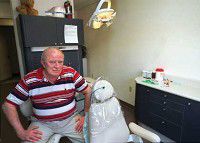Wellness center welcomes all
Published 4:00 pm Tuesday, February 7, 2006

- <I>DAMIAN MULINIX photo</I><BR>Dr. John Bardonner is the dental chief at the new Wellness Center in Tokeland.
TOKELAND – Top-quality health care and serving every Native American are the highest priorities of the Shoalwater Bay Tribal Wellness Center in Tokeland. But according to health director Marsha Crane, they’re out to help as many people – tribal or otherwise – as they can.
“If you’re going to have these facilities and these services, it only makes sense to open it up to the public,” she said, adding that without the money brought in by general public patients, they wouldn’t have half of the services or doctors they’re able to have now. “The tribe was very forward thinking when it decided to open it up to the public and third-party billing. A lot of the tribes previously didn’t do that.”
The Wellness Center, a new 14,000 square foot facility, opened late last spring. Before then it operated for a dozen years out of the tribal offices, located on the same lot, where they had limited space. From that beginning, it was decided to offer services to everyone, not just Native Americans.
It is because of this that they were actually able to build the new. Crane said the majority of the funds used for the project came from third-party billing.
Crane says for now it’s a perfect size, noting that prior to construction they toured other similar facilities and asked what those people would have done differently “if they knew then what they know now.” She said the overwhelming response was plan for more space than you need.
“Whatever you think you need for storage space, whatever you think you need for medical records, double that or quadruple that and you might hit the number right. And they were absolutely right.”
With the new building came more space and more options. They have a family practitioner two days a week, a full-time physician’s assistant, a chiropractor and massage therapist, each there one day a week. There’s also a full-service behavioral health program that includes chemical dependency treatment and mental-health counseling.
Crane also calls attention to their full-time dentist, Dr. John Bardonner, who “does a great job with children.”
“It’s really good. We’ve got all new equipment, nice building,” said Bardonner of the new facility.
Bardonner said they had only two dentist chairs in the old building, but now have four. They also didn’t have room for a dental hygienist, which now they have four days a week.
“It probably triples it [what they can do] because we have room for a dental hygienist, we have two chairs for emergency, plus the chair I usually work out of,” he said. “We’re seeing an average of five new patients a day, plus our regular patients. That’s a heck of a lot of people. “
Overall, the clinic averages around 80 patients a week between the different services. Crane said they have nearly 3,000 open charts on file now, with a 50/50 split between Indian and public patients. partly because they are one of the few facilities in the area that accept both MediCare and MedicAid, they are seeing people come from far and wide.
“I think because of the quality of care we’re providing and the breadth of services we’re providing now, we’re seeing people come from up around the Quinault area, Aberdeen, Montesano, even as far as Olympia,” Crane said, noting that they also have patients come up from the Peninsula.
As stipulated by the federally funded Indian Health Services, all of Pacific County is the Wellness Center’s Contract Health Service Delivery Area, meaning any Native American from a enrolled tribe in that defined area can come there for services free of charge. The note there is enrolled tribe, meaning the Chinook people don’t fall under that plan unfortunately.
“It is a very tough thing for the Chinook people,” said Crane, who added that they actually have a Chinook tribal member on their board of directors, Lois Burks.
The Wellness center receives limited funds from the IHS, even less since the war in Iraq began. Crane pointed out that the IHS is a federally funded program, as are prisons and VA hospitals. The money they receive for contract health is about half of what someone in a federal prison is funded for health care, and is also less then veterans.
“It’s very limiting, we have to be very careful,” she said. “We do everything we can to stretch those dollars out as far as we can to take care of folks.”
One of the things they have done to expand their abilities, is developed good contracts with the people they work with, like the hospitals and specialist medical providers in the community, to get a discount. Crane also noted numerous special programs which are funded by grants, the health program alone has 10 different grants.
“The ones I feel are probably making the most impact are for the women’s wellness program,” she said.

